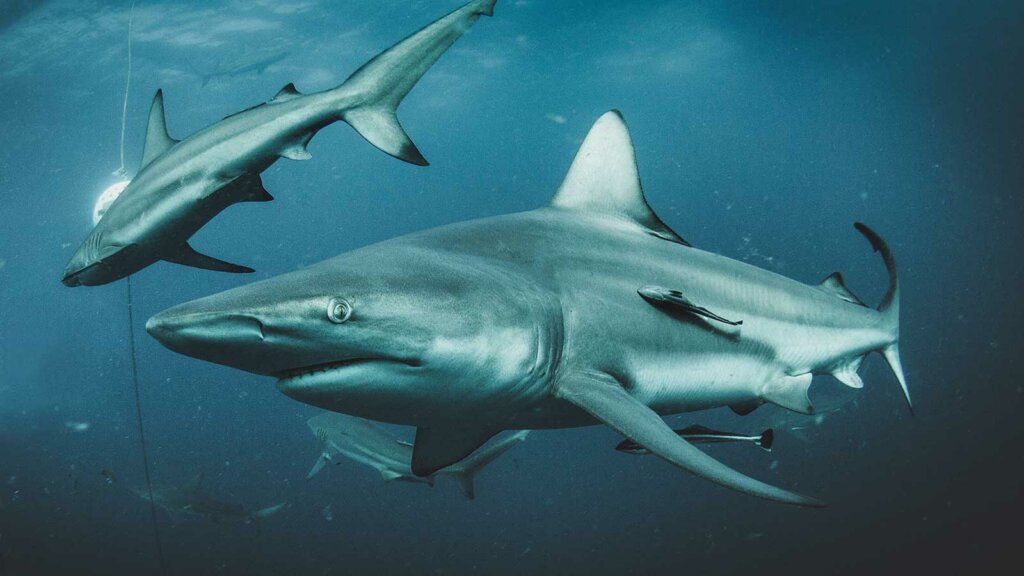
Odds of Getting Bit by a Shark | Extensive Report
CasinoAlpha will show you the odds of getting bit by a shark, in New Zealand and beyond. Are the chances of getting bit by a shark cause for concern?
Shark attack odds Infographic

Odds of shark attack incidents
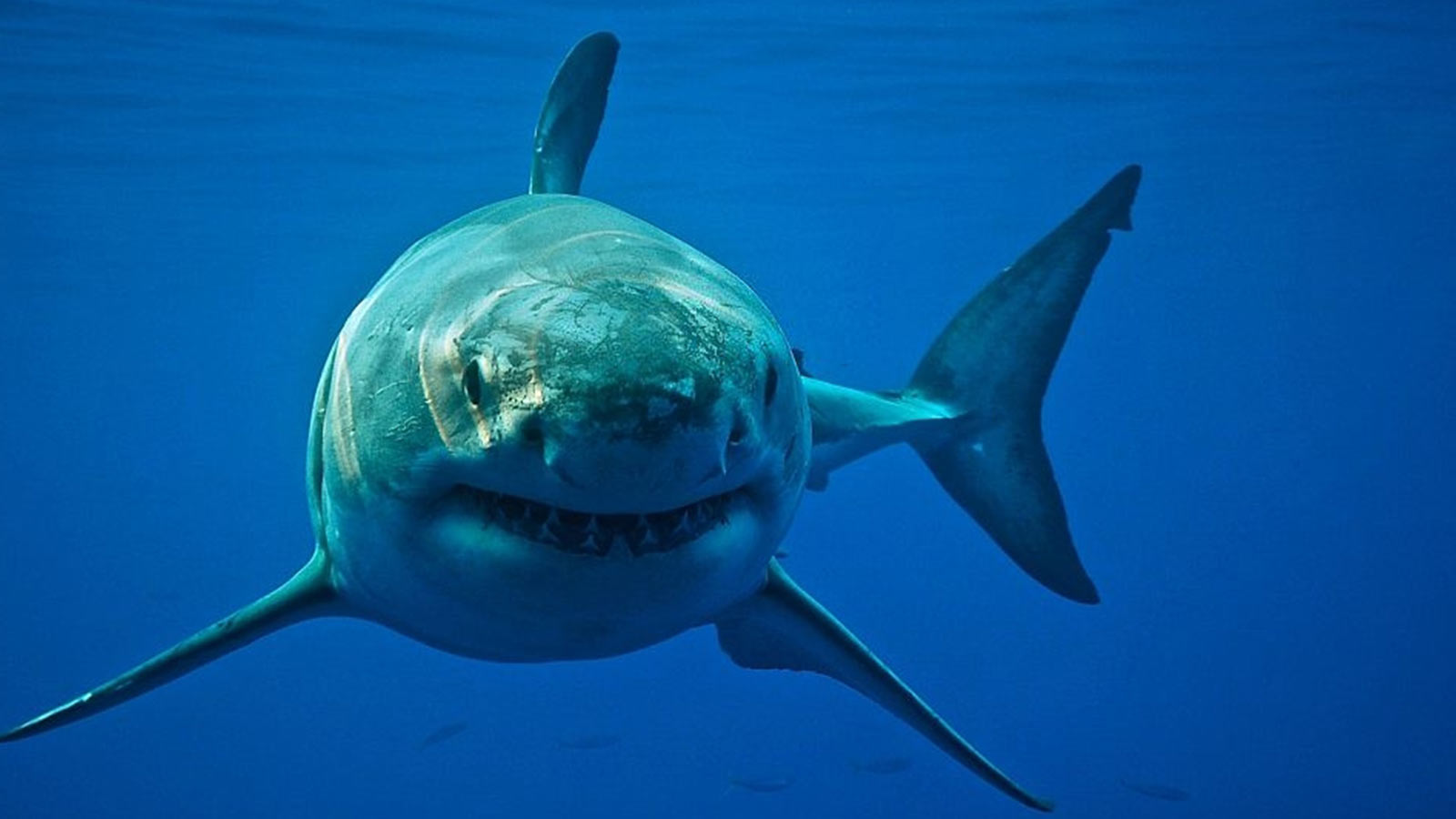
The odds of getting bit by a shark are 1 in 3.758.067 or a bit over 0.00002%, but more aspects will affect the chances of shark attack incidents.
Proceed with care
We provide data on shark-related risks strictly for informational reasons. Our content is based on trustable sources and expert studies. However, in a real-life situation, you should follow the instructions of specialists responsible with your safety.
Chances of getting bit by a shark are low
The odds of shark attack incidents occurring to the average person are very low. Still, some people may be more at risk than others.
New Zealand is one of those countries that has seen some fatalities related to sharks. Thus, residents may find it justifiable to be concerned about the chances of getting bit by a shark.
How likely are you to be bitten by a shark?
You are 3314 more likely to die from drowning than you would be to be munched on by a great white shark on a trip to the beach.
The chances of getting attacked by a shark are really small.
Odds of shark attack incidents differ based on species
And speaking of great whites, another myth worth deconstructing is that all sharks are dangerous to humans.
Species of sharks vary in aggressivity, with some types showing no risk towards humans or any mammals at that.
Chances of being bitten by a shark by species
- Great White Sharks: 333 in total
- Tiger Sharks: 131
- Bull Sharks: 117
- Requiem Sharks: 44
- Blacktip Sharks: 41 (non-fatal)
- Sand Tiger Sharks: 36(non-fatal)
- Wobbegong Sharks: 18(non-fatal)
- Spinner Sharks: 16(non-fatal)
- Hammerheads: 16(non-fatal)
- Bronze Whalers: 15
- Oceanic Whitetip Sharks: 15
- Blacktip Reef Sharks: 14(non-fatal)
- Blue Sharks: 13
- Lemon Sharks: 10(non-fatal)
- Nurse Sharks: 9(non-fatal)
- Grey Reef & Shortfin Mako Sharks: 9
- Sandbar, Sevengill & Whitetip Reef Sharks: 5
- Caribbean Reef, Cookiecutter, Spotted Wobbegong Sharks: 4(non-fatal)
- Mako Sharks: 3(non-fatal)
- Silky, Porbeagle Sharks: 2(non-fatal)
- Galapagos, Dusky Sharks: 2(non-fatal). 1 fatal
- Dusky, Port Jackson, Guitarfish & Leopard Sharks: 1(non-fatal)
Division between fatal and non-fatal events
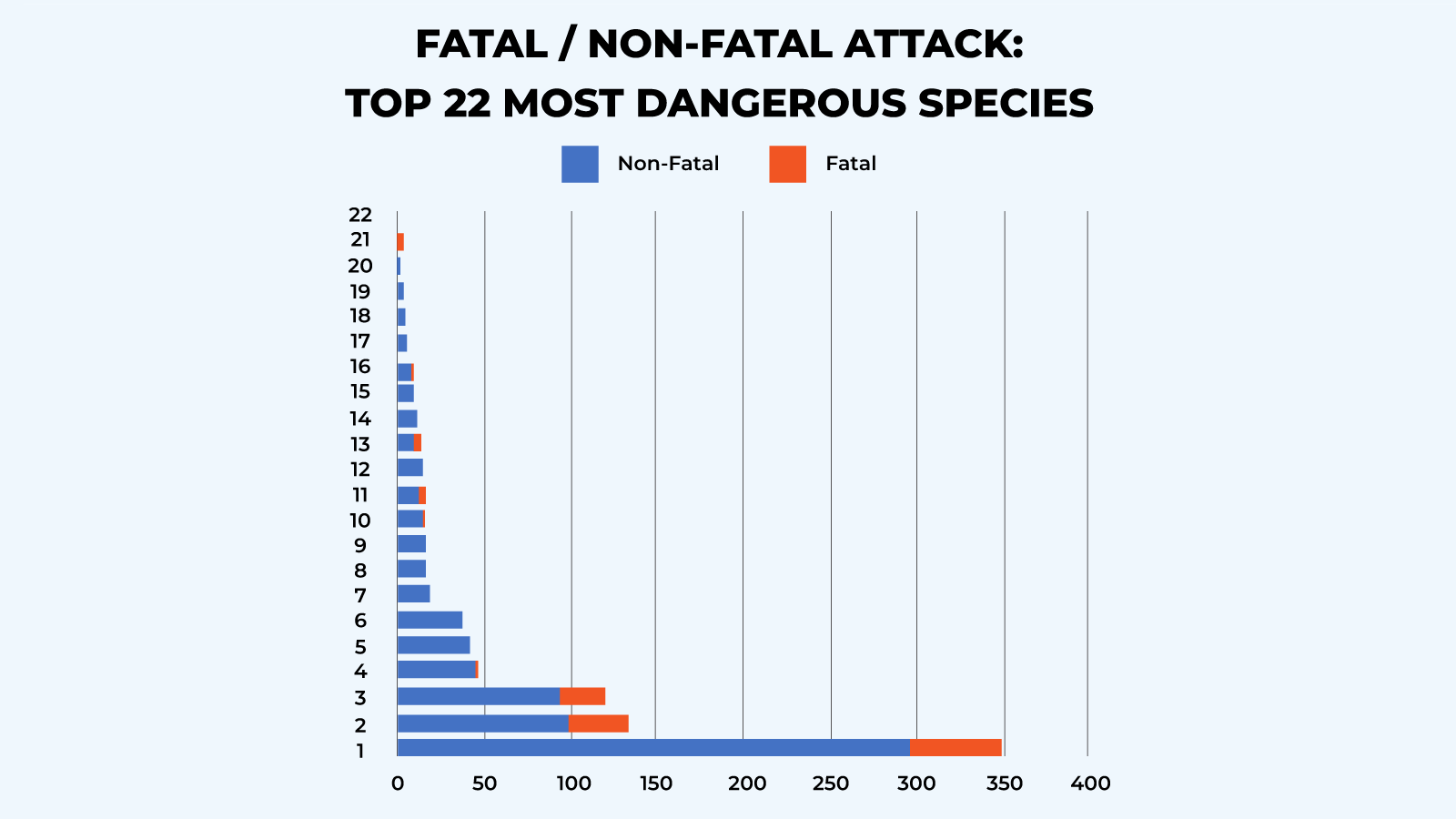
Odds of shark attack deaths
The odds of shark related deaths are about 15.763%.
Conditional odds
That is the case only in the event of having been attacked. Generally, your average individual has about 0.0000042% odds of shark attack death during one’s life.
Official sources cite the number of unprovoked shark attacks between 1958 and 2018 to be 2785, with 439 fatalities. This roughly amounts to 7.32 shark attack deaths per year.
We can play devil’s advocate and further see which species prove the deadliest among the bunch.
Fatality odds by species
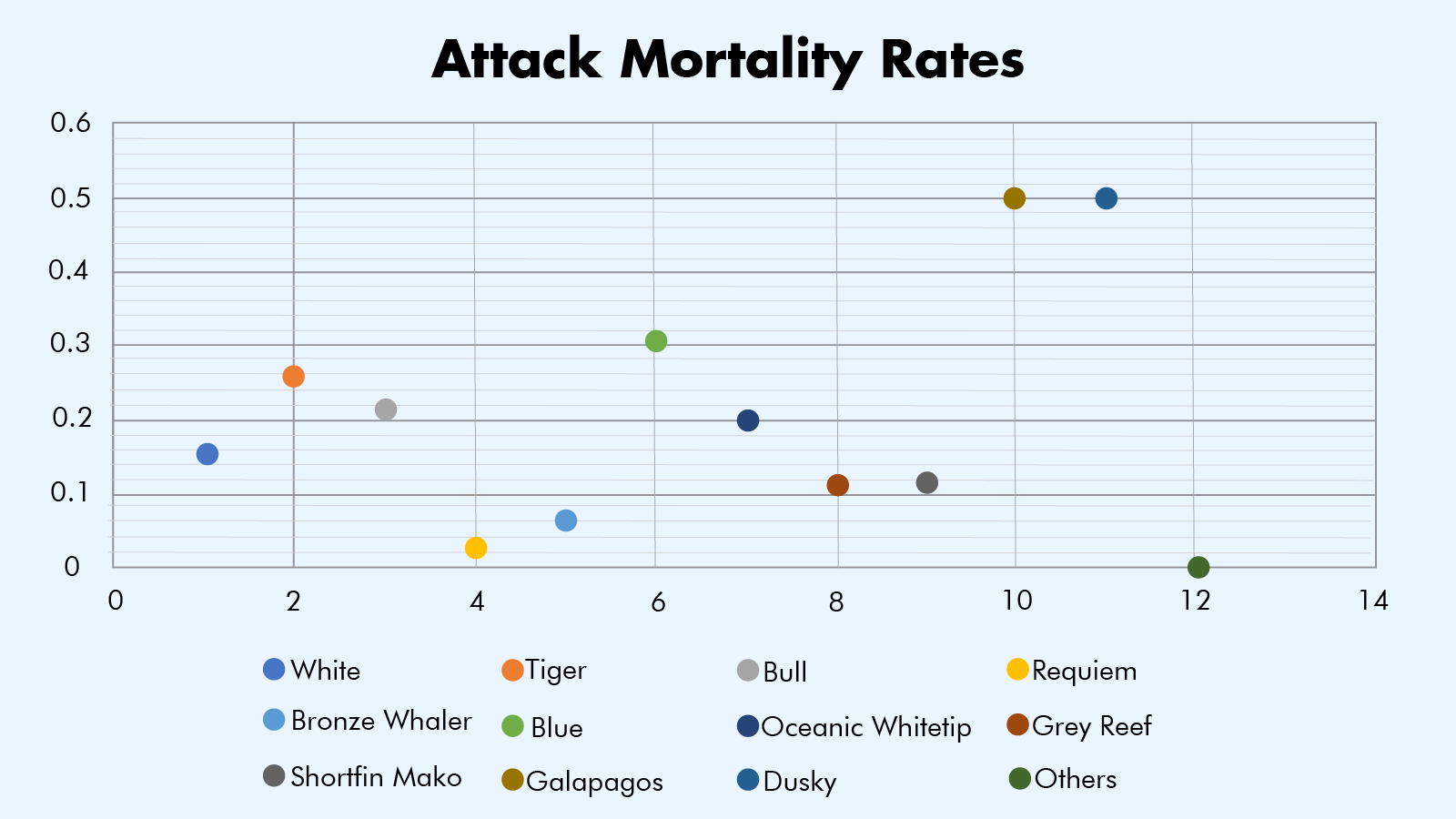
While death rates for meeting these predators may seem concerning in some instances, keep in mind that most species have only been implicated in a few and statistically irrelevant events.
In other words, if you were to bet in top online NZ casinos on which encounter with a species will result in death, you would probably opt for Galapagos or Dusky, being species with the lowest rates of shark attack deaths per year.
However, the number of incidents with these variants is so low that we cannot know the outcome probabilities. In all events, you are better to bet on blue, great white, or tiger species.
Odds of shark attack events resulting in loss of limbs
In the event of an encounter, the odds of being bitten by a shark and losing a limb are 7%, with 42% of events involving injuries and the loss of legs.
The activity you are engaging in when accosted by sharks will also play a role in which body parts you endanger. Here is how your seaside activities will affect your odds of getting bit by a shark by different bodyparts.
How activities affect your chances of getting bit by a shark
- Swimming – likely arms and legs
- Surfing – mostly legs
- Diving – torso, head, and lower legs.
Why trust our data
All the statistical observations and chances of getting bit by a shark have been computed by our experts, based on figures from trusted sources.
The content that you are reading is the result of a collaboration between marine biologists, experts in shark behaviour, and our own statistical specialists. To compute the odds of getting bit by a shark, we have considered global data and accounts that go back to the 1700s, in some cases. Nevertheless, our findings have their limitations and may change in the future.
We urge you to return to our article, as it will be updated in light of the most recent events.
Why do sharks attack humans?
There is no actual evidence that sharks hunt humans actively, with most cases being explainable by our likeness to seals or sea lions, their natural prey.
Even though humans are not their usual target, one could contend that sharks would instead opt for unadapted, slow-moving humans rather than quick-swimming sea mammals. However, most experts agree that sharks generally ignore us, even when we’re swimming around their territory.
One case when sharks won’t ignore us is when we have a strong resemblance to their specific prey. This is the case of surfers, whose board may look like a seal’s belly to the nearly-blind predators.
Will sharks attack you for no reason?
While sharks are most likely to ignore you, there are some behaviours that can increase your chance of shark attack incidents.
Sharks have been reported to attack humans when they show confusion, agitation, or curiosity. If you seem erratic, this may motivate the predator to investigate and even attack.
It is good to remember that, even when this happens, sharks will act out of fear. So, as long as you do not spook the beast and keep a distance, you will be fine.
Do sharks attack humans when they smell blood?
No. sharks attacking humans due to smelling blood is a myth originating in film depictions, with no scientific bases.
There are no reports of a bleeding cut leading to increased risks or aggressivity from sharks.
Confirmed fact
Skylar Thomas of the White Shark Studio Company led an experiment that directly infirmed the chances of getting bit by a shark from smelling blood.
Odds of shark attack cases per location
A better way of figuring out the odds of shark attack incidents that you should care about is by considering the locations where they most frequently occur.
In New Zealand
Since 1580, New Zealand has faced 53 such recorded unprovoked attacks. The distribution of their occurrence is homogenous, and it greatly depends on the regions:
Events & odds of being bit by a shark by region
| Region | Occurrences | Odds of shark attack |
|---|---|---|
| Oakland | 8 | 1 in 6.625 |
| Waikato | 1 | 1 in 53 |
| Gisborne District | 1 | 1 in 53 |
| Taranaki | 3 | 1 in 17.667 |
| Wellington | 4 | 1 in 13.25 |
| Marlborough District | 2 | 1 in 26.5 |
| Canterbury | 4 | 1 in 13.25 |
| West Coast | 2 | 1 in 26.5 |
| Otago | 10 | 1 in 5.3 |
| Southland | 6 | 1 in 8.833 |
| All others | 12 | 1 in 4.417 |
Shark attacks in New Zealand Map
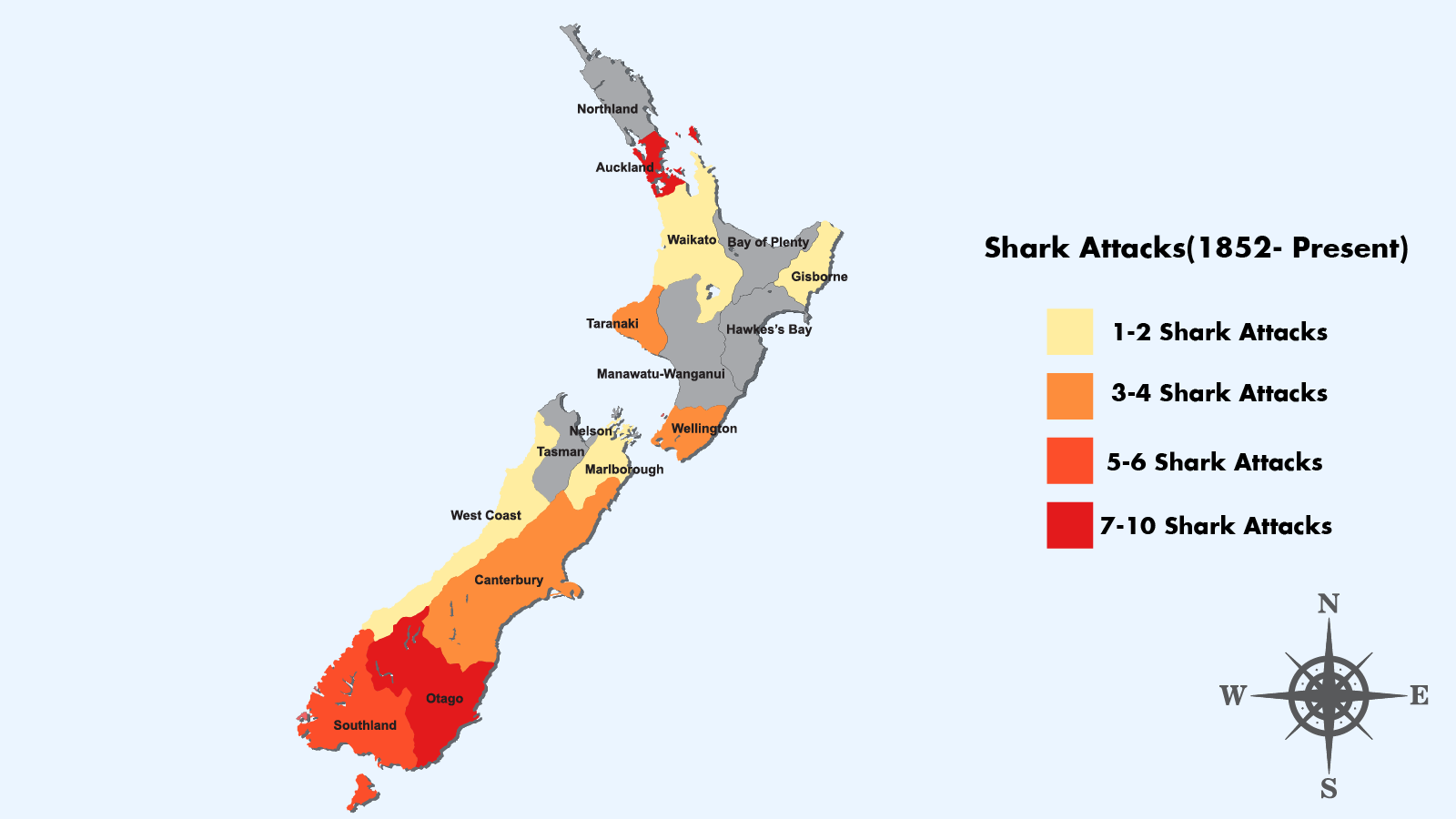
Odds of shark attack incidents for a New Zealander
Clinton Duffy, a shark expert from the New Zealander Department of Conservation, states the rate of occurrence and chances of getting bit by a shark as one or two per year.
Experts deem it to be very low, the same being true for resulting fatalities.
For the current New Zealand population, the odds of getting bit by a shark as a New Zealander is about 0.00002% in any one year.
Surprisingly, although the island nation has seen more events than most countries, the probability is just the same.
Chances of shark attack events worldwide
| Country | Cases | Occurrence rates in region | Odds for average citizen |
|---|---|---|---|
| America | 1516 | 1 in 1.85752 | 1 in 217348.3 |
| Australia | 670 | 1 in 4.202985 | 1 in 38343.28 |
| South Africa | 255 | 1 in 11.04314 | 1 in 232588.24 |
| Brazil | 107 | 1 in 26.31776 | 1 in 1986915.9 |
| New Zealand | 53 | 1 in 53.13208 | 1 in 95924.53 |
| Papua New Guinea | 48 | 1 in 58.66667 | 1 in 186395.83 |
| Reunion Island | 47 | 1 in 59.91489 | 1 in 859959 |
| Mexico | 41 | 1 in 68.68293 | 1 in 3143902.439 |
| Bahama Islands | 33 | 1 in 85.33333 | 1 in 400516 |
| Iran | 23 | 1 in 122.4348 | 1 in 3651739.13 |
| Fiji Islands | 23 | 1 in 122.4348 | 1 in 908561 |
Incidents Across the World Map
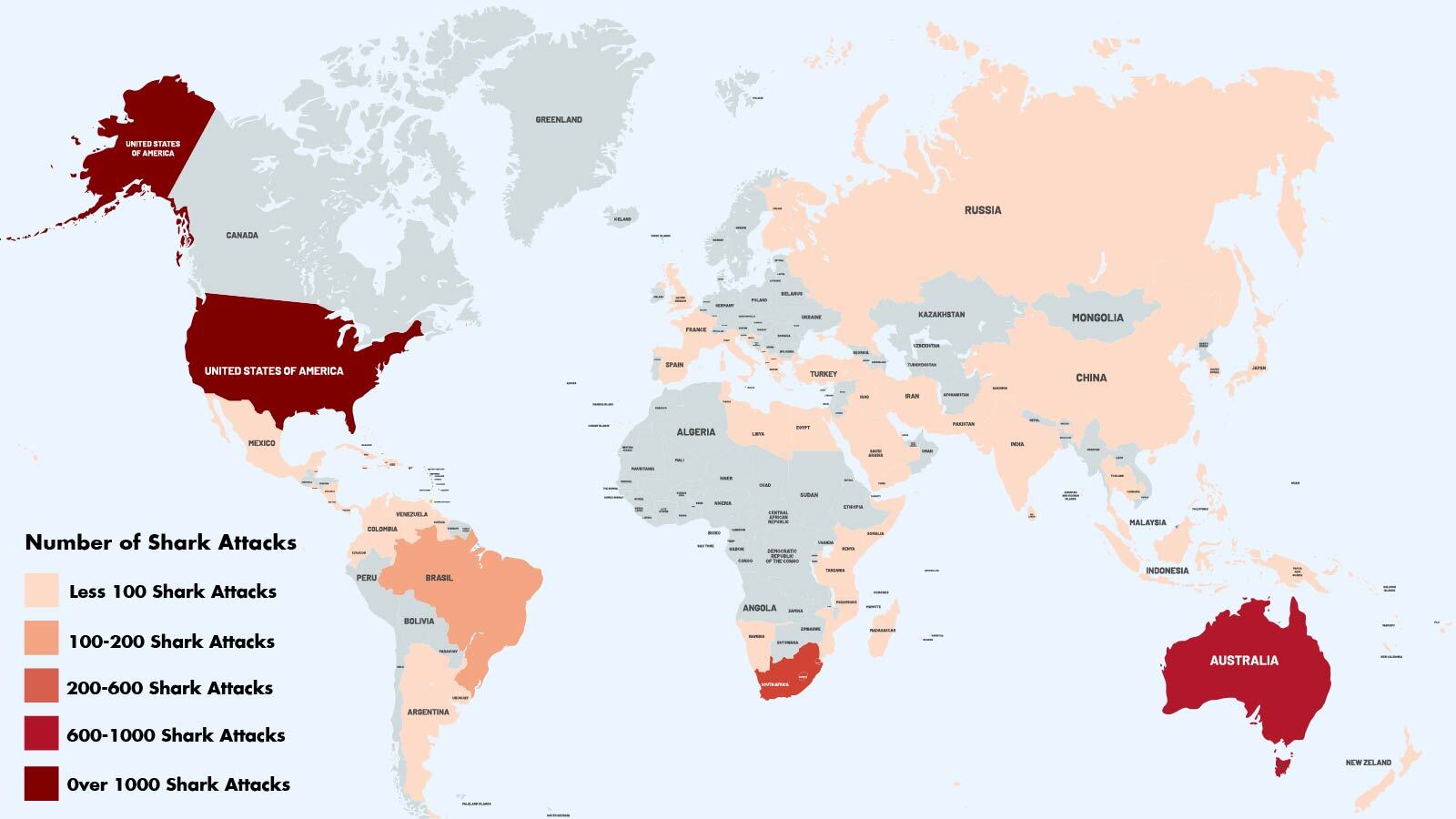
While New Zealand is witness to some instances, its neighbour, Australia, sees more events and higher odds of being bitten by a shark. Aussies have seen 645 confirmed occurrences, 259 of which have proven to be fatal.
This is aggravating since, despite the US being the top location for shark-related incidents, with 1105 such events, only 36 of them resulted in a death. Additionally, New Zealand’s neighbour has seen its last fatality as recently as this year.
It seems like it is not New Zealanders that should be concerned with the odds of getting bit by a shark, but their neighbours to the north.
Odds of shark attack fatalities in the US and Australia
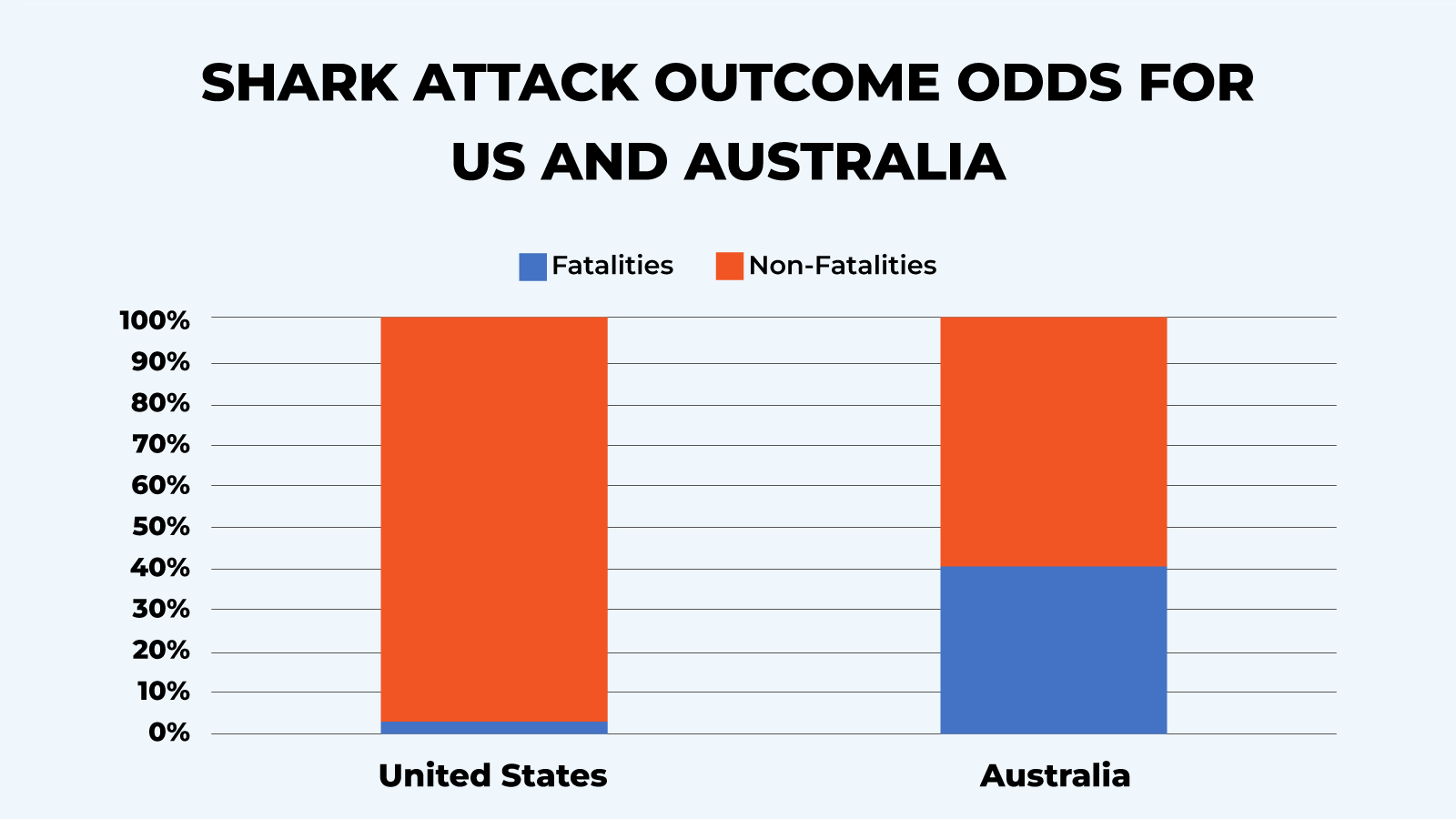
Australian states with highest odds of getting bit by a shark
- New South Wales (267 cases)
- Queensland (199 cases)
- Western Australia (107 cases)
- South Australia and Victoria (42 cases)
- Tasmania (14 cases)
- Northern Territory (7 cases)
The region with the least events and odds of shark attack occurrences, when excluding the Capital Territory, must me the Northern Territory. Here is a map showing the odds of getting bit by a shark across Australian states.
Odds of shark attack in Australia map
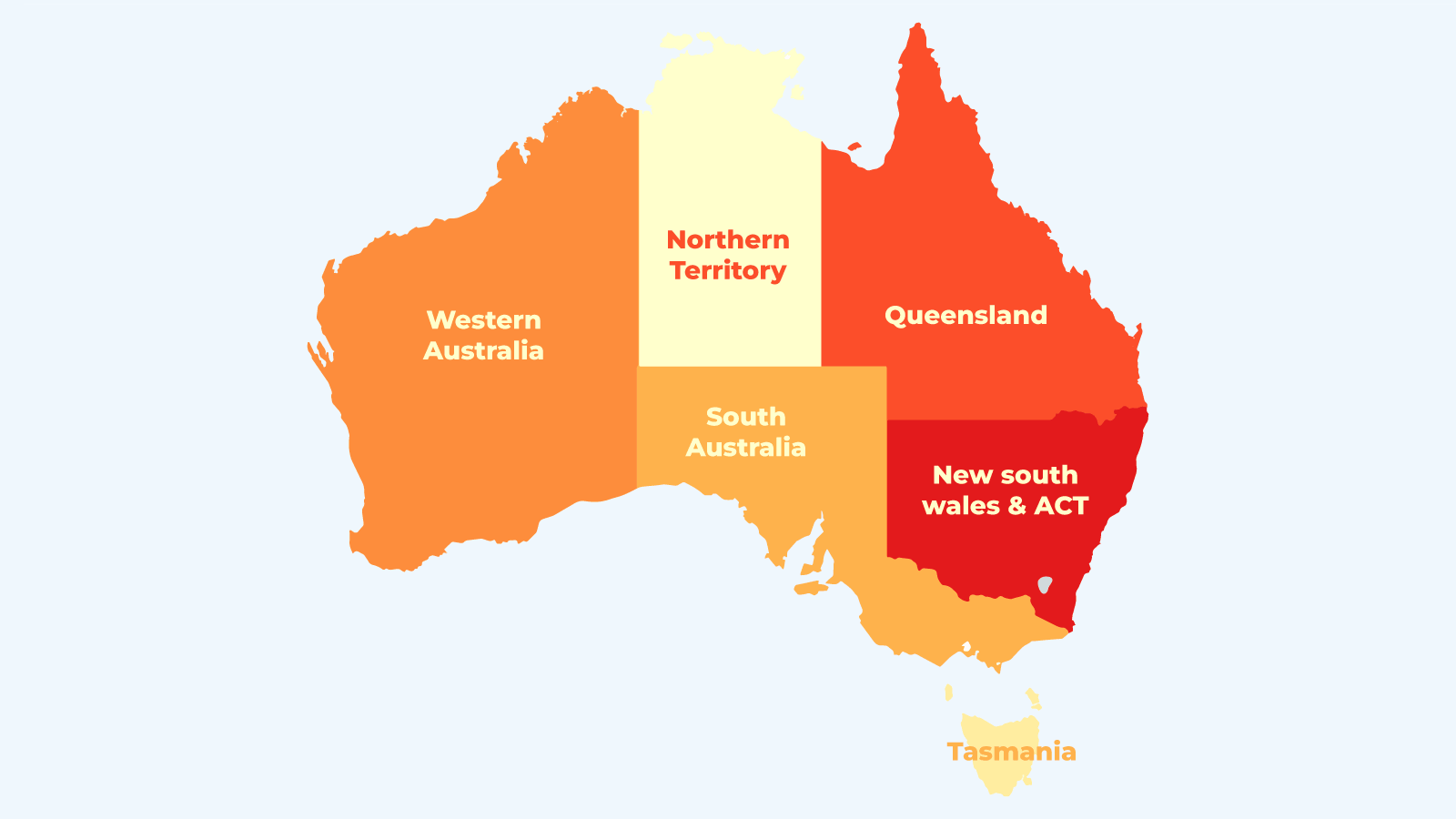

10 riskiest US states for shark attacks
- Florida: 896 cases
- Hawaii: 182 cases
- California: 132 cases
- South Carolina: 111 cases
- North Carolina: 76 cases
- Texas: 44 cases
- Oregon: 29 cases
- Georgia: 17 cases
- New Jersey: 15 cases
- New York: 12 cases
Other states had similar cases, but none that is not in the top ten had more than ten events. It is safe to say that, if you do not see the state on the list, the odds of getting by a shark are irrelevant.
Florida however, leads uncontestedly with more than four times the number of events of the second place holder.
Shark attack in Florida map
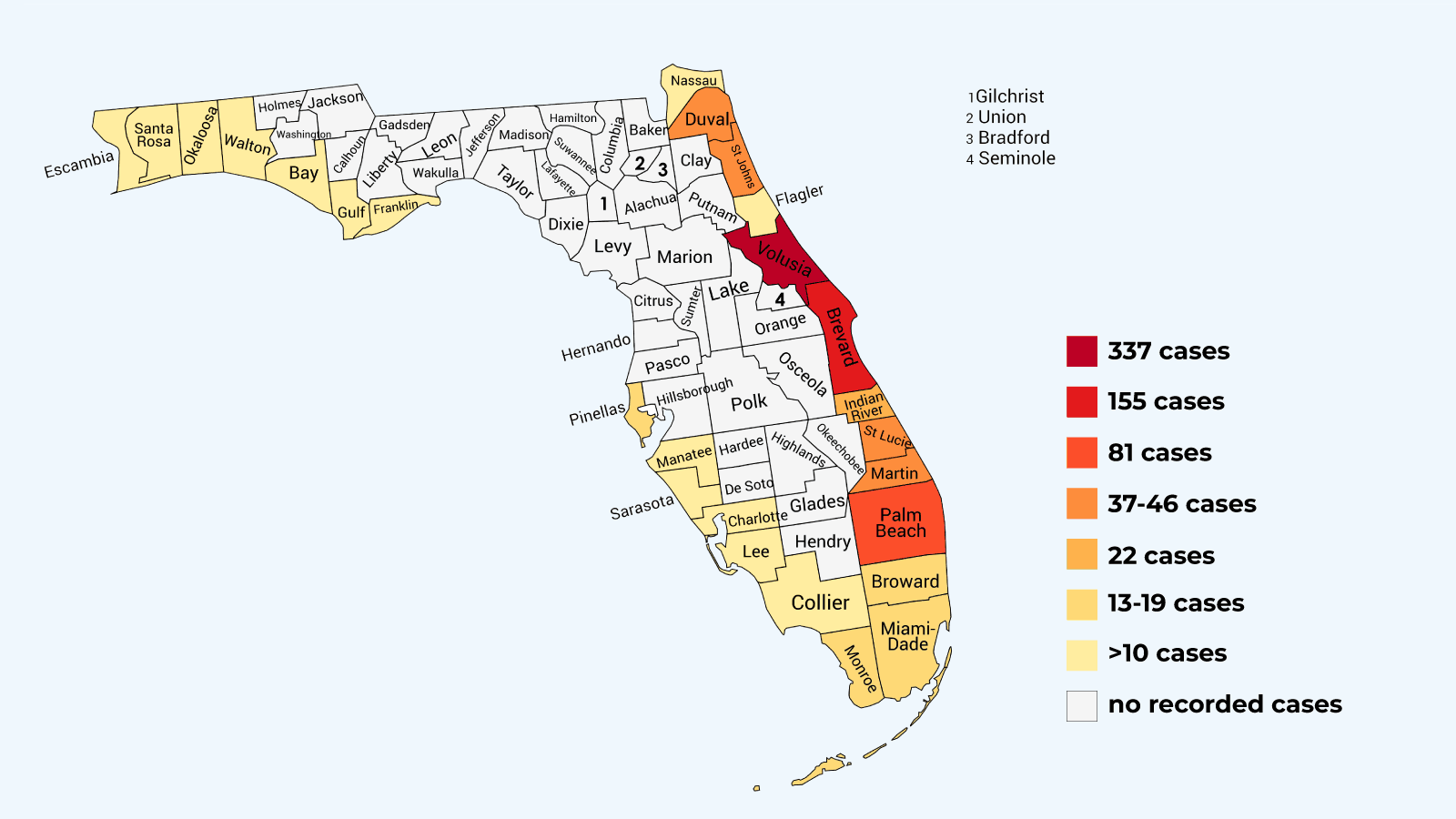
Odds of getting bit by a shark, in comparison
Are sharks the ones you should think about? Experts would beg to differ, as, despite the gruesome implications of such an event, it still proves unlikely to ever occur in your lifetime.
Additionally, several sources cite comparisons with life-threatening hazards that should be of greater concern when contrasted with the slim odds for these beasts attacking.
Odds of shark attack cases vs other animals
Mosquitoes are quoted to have caused around 750000 deaths annually since 2018, mainly through carrying various transmissible diseases, like malaria. Snakes, too, racked up a staggering 100000 average body count within the same period.
Human’s friends and fellows
The human’s best friends, dogs, have also been responsible for around 35000 casualties.
However, your fellow human holds the second spot for the deadliest creature with 437000 annual deaths caused.
Unlikely killers
The chances of getting bit by a shark are even topped by seemingly harmless creatures, such as snails, that cause on average 20000 deaths annually. Freshwater snails carry parasitic worms that can infect people with schistosomiasis. Its effects are unpleasant, to say the least.
However lower, roundworms, tapeworms, or even the ominous-sounding assassin bugs racked up death counts that go into thousands or tens of thousands.
As far as water killers are concerned, crocodiles are a much better candidate for the apex predator, with their 1000 annual deaths towering over the meagre probabilities for water predators attacking.
Sharks compared to other marine animals
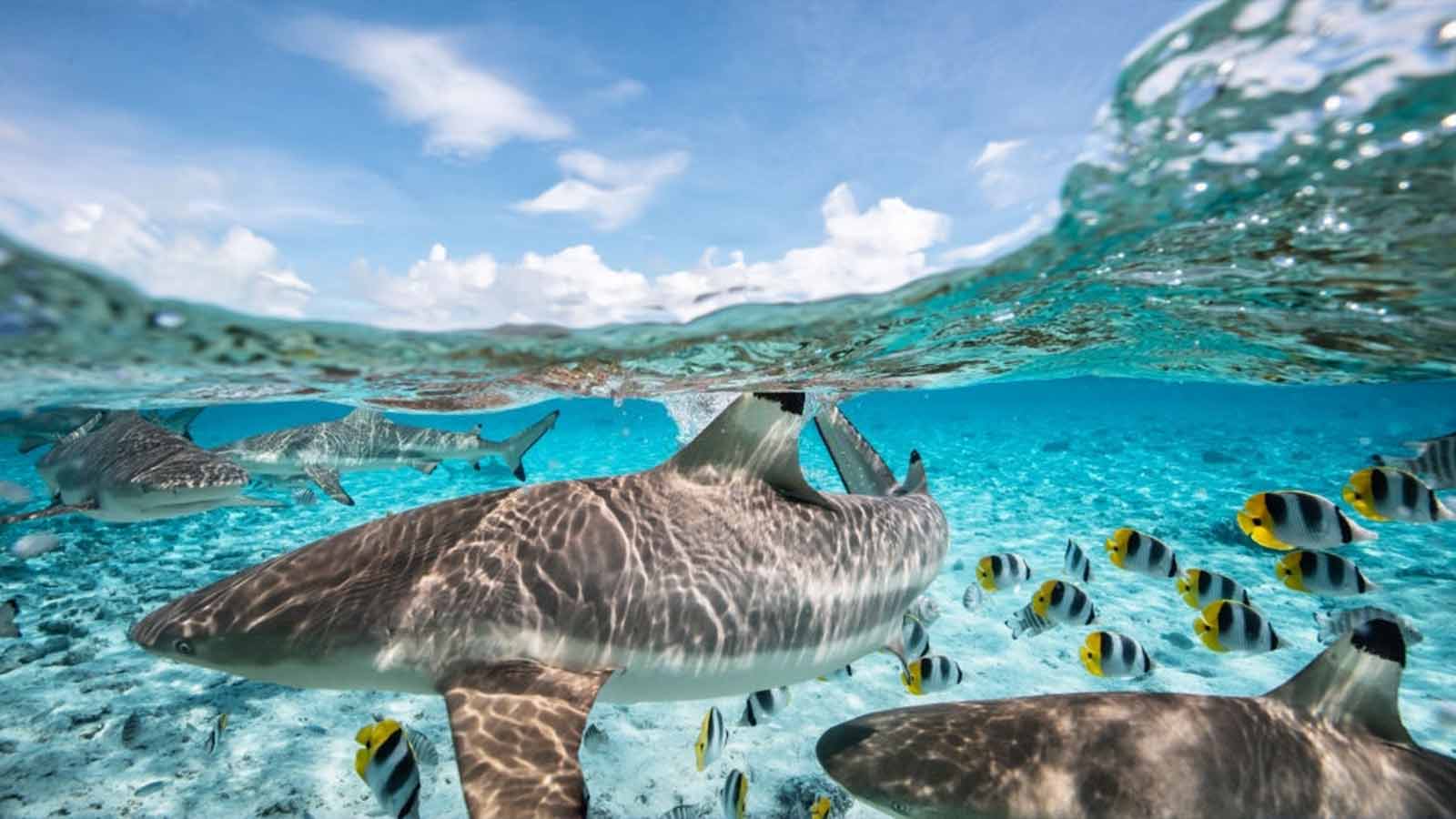
Surely, sharks remain the deadly champs of the open seas. Or so you would think. Our dear dying oceans are filled to the brim with dangerous (and mystifyingly odd) creatures.
-
Stingrays
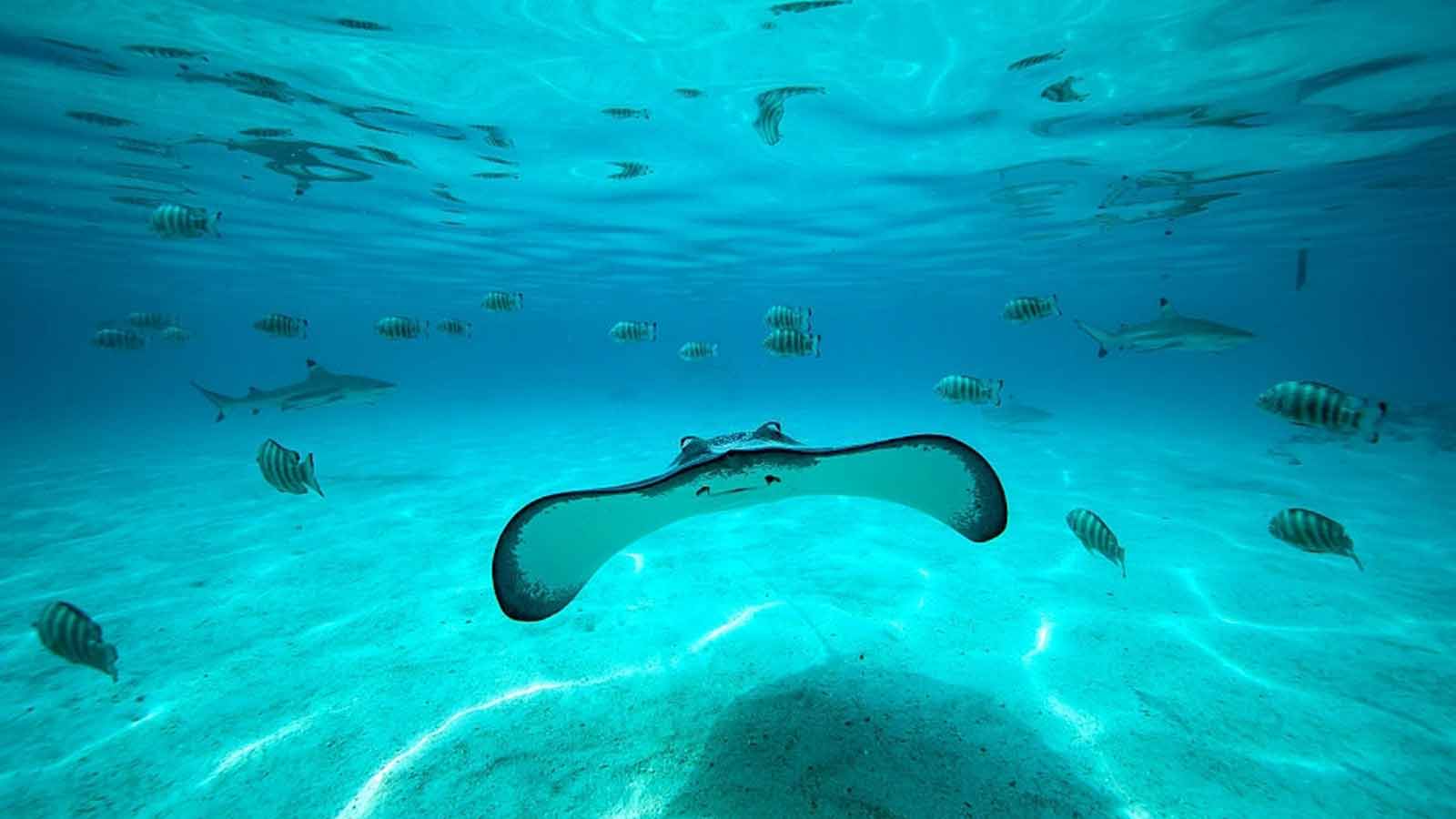
The stingray has gained renown for its potential deadly danger, following the death of famed TV personality Steve Irwin. The Aussie superstar was stung by one of these beasts, an event that quickly resulted in his unfortunate demise.
-
Flower Urchin’
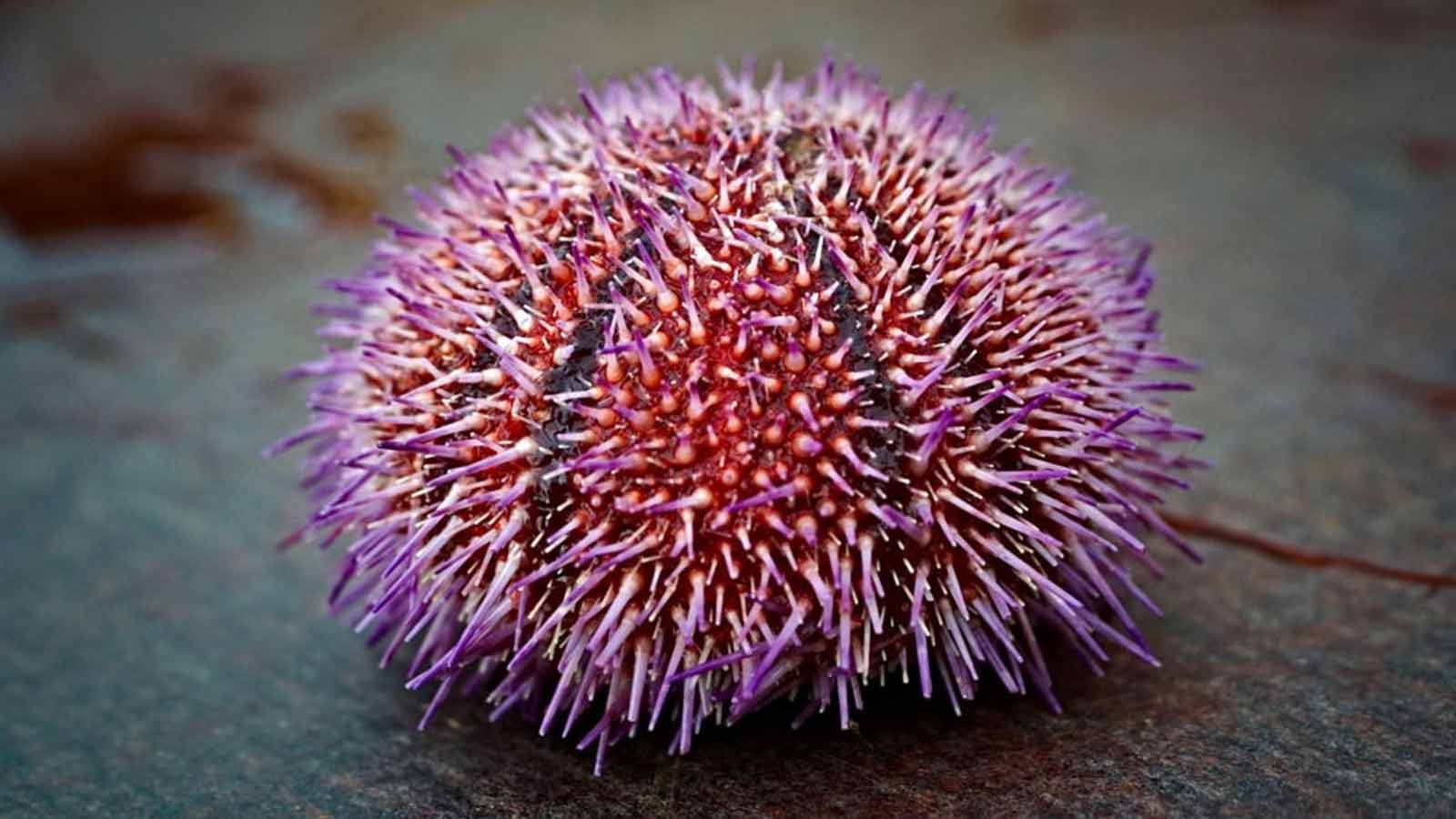
This being is where natural beauty meets deadly danger. The flower urchin can inject humans with highly toxic venom. So dangerous it is that it earned the Deadliest Sea Urchin moniker in the 2014 Guinness Book of World Records.
-
Electric Eel
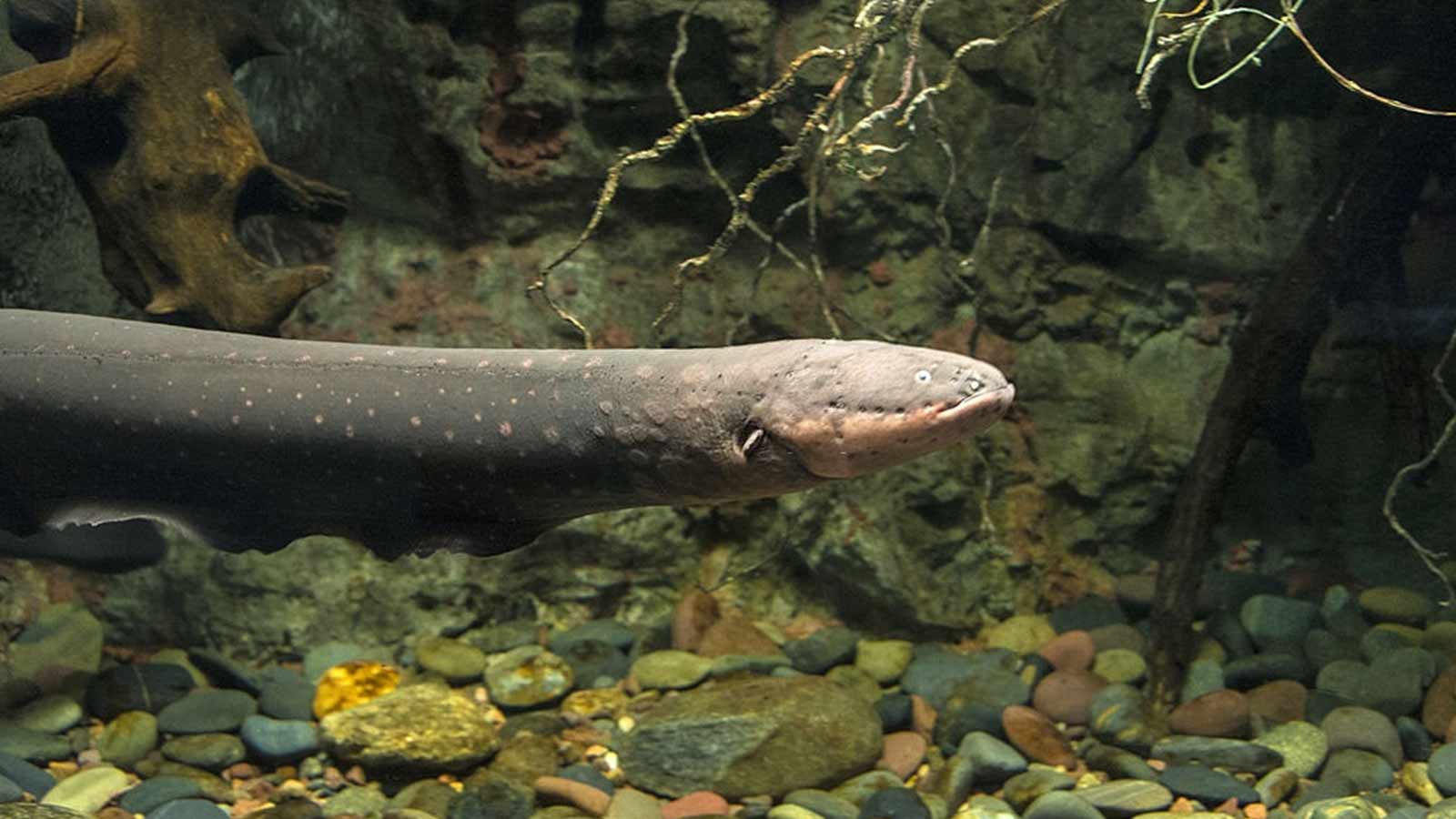
MGMT make being shocked by an electric eel sound fun and enticing. However, the current discharged by this 6000-electrolyte-containing sea serpent is nothing of the sort. The electric current generated as a defensive (and in other contexts courting) measure can prove deadly for non-electricity-producing animals.
-
Textile Cone Snail
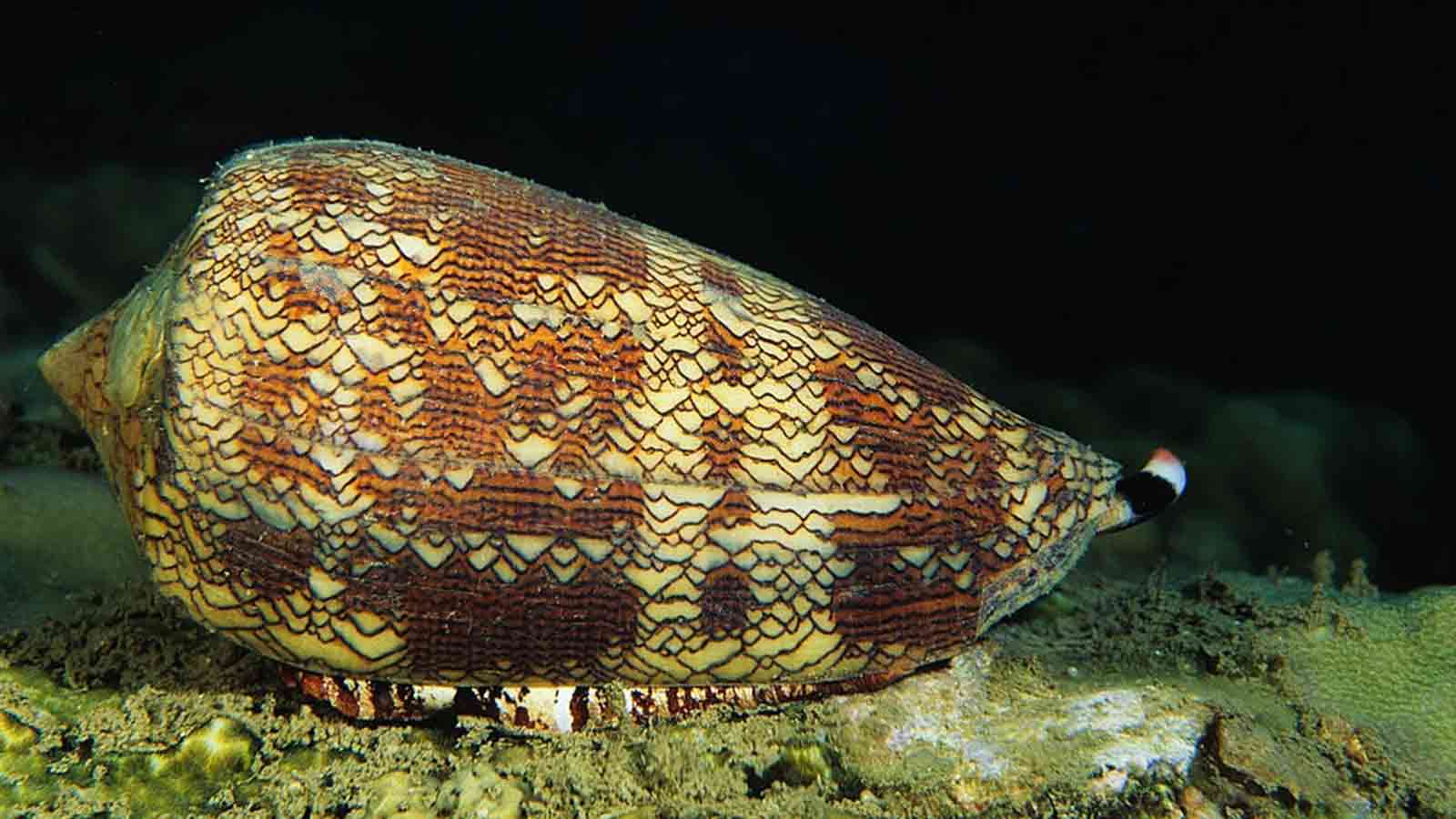
This puny creature, too, packs a punch. Its radular teeth can puncture a human’s skin and inject a dose of concentrated toxin. Its effects are paralysis and eventually death. Considering this fact, if you are ever being put in the position of choosing between being circled by great whites or stung by a cone snail, you now know which one to go for.
-
Blue-Ringed Octopus
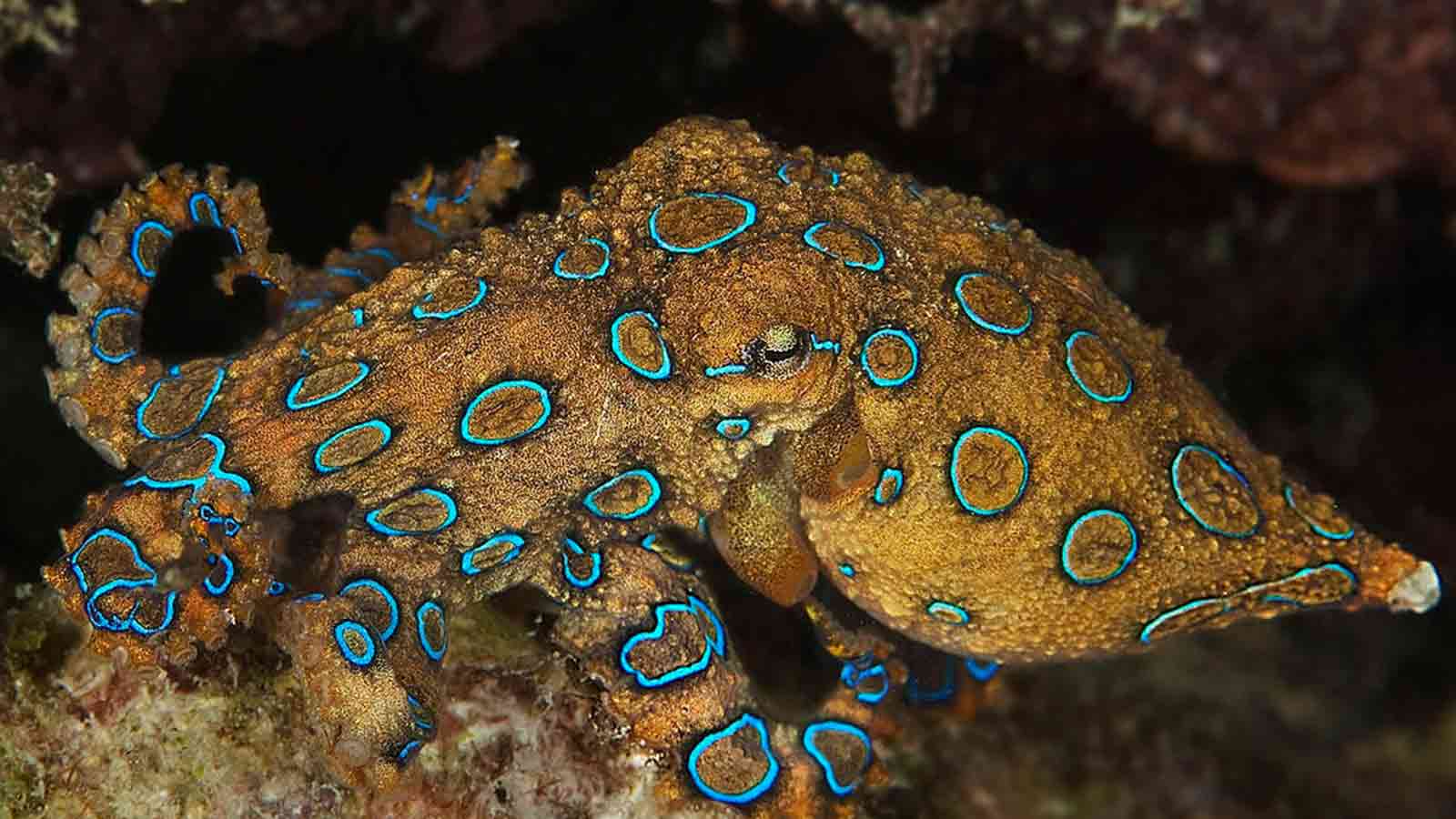
Octopi are another class of scary sea critters, with tall tales of gargantuan Krakens ripping ships into shreds being yesterday’s sailors’ favourites.
However, size is not the issue here. This tiny and albeit cute octopus produces a toxin 1000 times stronger than cyanide.
-
Sea Snakes
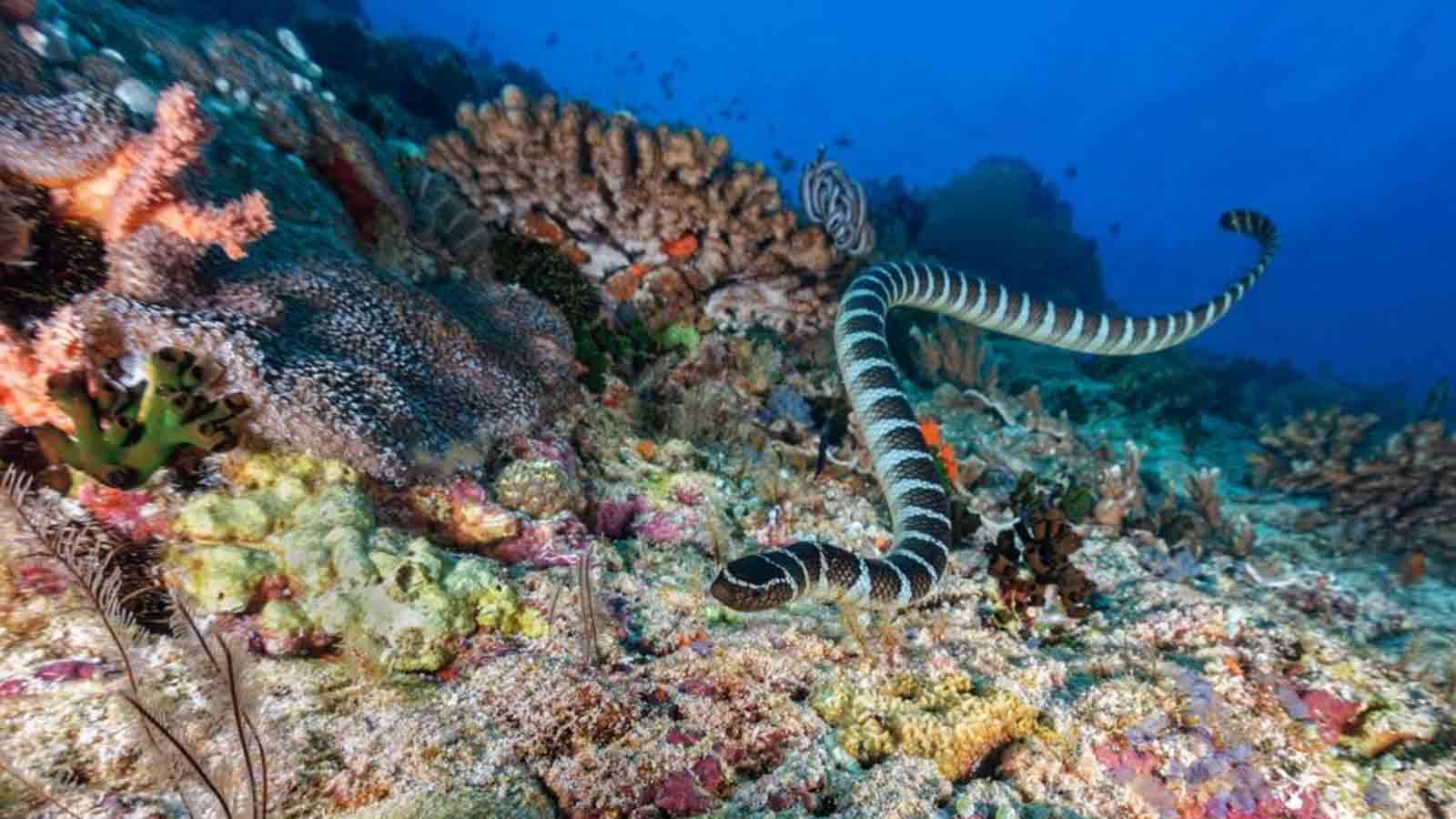
Both the Dubois and beaked sea snakes are venom-filled vicious predators. The beaked species, for instance, can inject six times the amount of venom necessary to kill a human through a single bite. Beyond their danger, their length and girth make them animals you do not wish to encounter while having a snorkelling session in Thailand or Australia.
Odds of shark attack vs lightning and more
-
Disease is more dangerous than sharks
The 1 in 6 chances of dying from heart-related morbidity puts the probability of being gored by these water predators to shame. Cancer is a close second with its staggering 1 in 7 chances of ending the sufferer’s life.
-
Odds of shark attack vs lightning
The chances of sharks attacking you, both fatally and non-fatally, are trumped by the quite deadly odds of being struck by lightning. These amount to 1 in 138849.
A cataclysmic storm can also put an end to one’s life, with the odds of this happening being 1 in 58669, still 64 times likelier than sharks attacking you.
-
Who’s the seaside danger, sharks or the sun?
It turns out that sharks should not be the biggest concern when at the beach. As pleasant as it is, the sun can also prove to be a killer. There is a 1 in 8248 chance that a sunstroke will be a beachgoer’s demise.
For context, the probability is over 455 times higher than the cited odds of getting bit by a shark. And remember that the latter also includes non-fatal encounters.
-
The risks of preventable causes
The odds of dying from preventable causes are 1 in 24. As vague as it may sound, the preventable qualifier is important.
While an encounter with a great white may seem like the hand of fate waving you goodbye, the chances of shark attack occurrences and shark attack deaths per year would indicate that one’s dismay will come from a mundane yet preventable cause. Isn’t that sad?
How to lower the odds of shark attack events
- Do not lose the shark out of sight.
- Staying calm and averting from making hasty or sudden moves improve your survival chances.
- Proceed slowly to land or the boat without turning your back on it.
- Try finding cover such as a rock when diving.
- Try going into a back-to-back defensive position when not alone.
- In a fighting scenario, hit the sharks in the snout, gills, or the eyes.
- You do not need to overpower the beast. A well-directed hit will scare it away.
- The best escape chances are when you opt to swim smoothly and without great splashing. Use the reverse breaststroke, for instance.
















